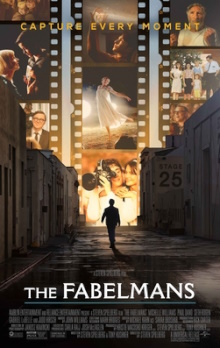The last Steven Spielberg film I watched was Ready Player One and that was only because it was on a flight. The last one that I’d actually sought out to watch was Indiana Jones and the Kingdom of the Crystal Skull and we hated it. I was doubtful that I’d ever watch a Spielberg film again but then he made what is effectively his autobiography and of course it instantly becomes essential watching. At first, I was annoyed by how this film telegraphs every single thing that it wants to say so very obviously. Yet I found myself immersed all the same in the world of Spielberg’s childhood and its insights about the power of cinema. By the end, it’s impossible to deny the conclusion that this is a triumph both artistically and personally for Spielberg himself.
This film recounts a fictionalized version of Spielberg’s life from roughly the age of 7 to 18. Young Sammy Fabelman watches The Greatest Show on Earth in a cinema with his family and is entranced by the scene of a crashing train. He gets a toy train set for Hanukkah and uses it to recreate the crash. His mother Mitzi, who was a promising pianist before giving up her career to have a family, gives him his father’s 8mm camera so that he can capture and replay it again and again. Thus is born his love for making films. His mother encourages this interest while his father Bert, who is a pioneering engineer in computers, prefers that he create more concrete things. Sammy enlists his sisters and his friends to make short films to great success and as his skills keep improving. He also shoots his family camping trip that includes his father’s colleague and best friend Bennie who is always hanging out with their family. His father knows that something is wrong in his marriage but is unable to articulate it to Sammy. It’s only when Sammy is editing the vacation footage that he realizes that his mother and Bennie are in love with each other, sparking further growth in his own understanding of the power of film.
This isn’t a short film but the time just flies past with how easily every scene in it is digested and how smoothly it flows. As my wife observed, it feels like a children’s movie with how little it asks of the audience. Yet the portraits of the various key people from Spielberg’s life are so compelling and the central theme of the power of cinema so insightfully made that it wins you over all the same. There is so much humor, in Sammy’s flirtations with Monica who is both very religious and very horny, so much love in his relationship with both parents, and so much personal growth as he comes to see his parents as fellow human beings in their own right, who have desires and wants of their own separate from himself. I appreciated how the film captures not just the love of cinema but also how the medium can be used for both good and ill, how it can reveal truths about a person he or she may not be aware of, and how it can make or destroy someone’s public image. It’s fantastically well-made and every frame of it is entertaining, down to the remakes of the short films Spielberg himself made at the time.
There no real surprises in this film. The audience can see the relationship brewing between Mitzi and Bennie coming from a mile away and there is no doubting how much kindness and respect Spielberg has for his parents. So it’s kind of astounding that he was still too afraid to make this film until after both of them had already passed away. Perhaps he feared hurting his parents with the admission here that he as an artist himself he feels more in tune with his mother than his father. Another intriguing scene is the lesson he receives from his circus worker uncle about the sacrifices that have to be made in the name of art. Here the film lacks any real bite however as Sammy is never shown having to make any such sacrifices. It’s such a wholesome, kid gloves kind of film that even the bullying scenes are muted in their impact.
I liked this much more than I thought I would and especially appreciated how it sticks to a director’s point of view throughout. The cameo at the end is perfect and it’s great how the lesson Sammy learns isn’t some mystic bullshit but straightforward and practical advice about the craft of filmmaking. After watching this, I felt a little bad that Everything Everywhere All at Once swept the Oscars leaving this nothing. This is frankly the best kind of film that a director nearing the end of his career can make and Spielberg has stated in interviews that he has no new projects lined up at the moment. I can understand how he feels that he has given all that he can give in this film.
